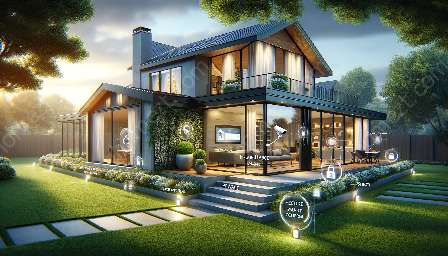As we delve into the fascinating realm of smart home design, it's imperative to consider the pivotal role that big data plays in shaping the modern residential landscape. Big data, with its vast potential and insights, seamlessly integrates with intelligent home design and influences the evolution of home & garden spaces.
Understanding Big Data
Big data refers to the massive volume of structured and unstructured data that inundates businesses and consumers on a daily basis. When it comes to smart home design, this data can encompass information from various sources such as sensors, devices, and user interactions. The plethora of data points generated by smart homes equips homeowners and designers with invaluable insights, ultimately enabling the creation of innovative and efficient living spaces.
Enhancing Intelligent Home Design
The synergy between big data and intelligent home design is undeniable. By harnessing the power of big data analytics, designers can gain comprehensive knowledge about user behaviors, preferences, and usage patterns within a home environment. This in-depth understanding allows for the customization and optimization of smart home features, ensuring that they are tailored to meet the specific needs and lifestyles of residents.
Moreover, big data empowers intelligent home design by facilitating predictive maintenance and proactive management of home systems. Through predictive analytics, potential issues can be identified and preemptively addressed, thereby enhancing the reliability and performance of smart home technologies. These predictive capabilities not only elevate the user experience but also contribute to a more sustainable and cost-efficient home & garden ecosystem.
Transforming Home & Garden Spaces
When contemplating the interplay of big data with home & garden spaces, one cannot overlook the transformative effects it precipitates. The wealth of data generated from smart homes enables refined insights into energy consumption, environmental impact, and resource utilization. This knowledge fuels the development of sustainable and eco-friendly design practices, ushering in a new era of conscientious residential living.
In addition, big data-driven smart home solutions contribute to the creation of harmonious and aesthetically pleasing home & garden environments. By considering factors such as natural light, air quality, and overall ambience, designers can curate living spaces that seamlessly blend cutting-edge technology with the warmth and comfort of traditional home designs.
The Future of Residential Living
The amalgamation of big data, intelligent home design, and home & garden aspirations heralds a future where residences offer unprecedented levels of comfort, efficiency, and sustainability. As big data continues to evolve, its role in smart home design will become increasingly pivotal, shaping homes that are not only smart and functional but also intuitive and environmentally sensitive. With the synergy of big data and intelligent design principles, the future of residential living is destined to be a harmonious fusion of technology, nature, and personalized experiences.





























